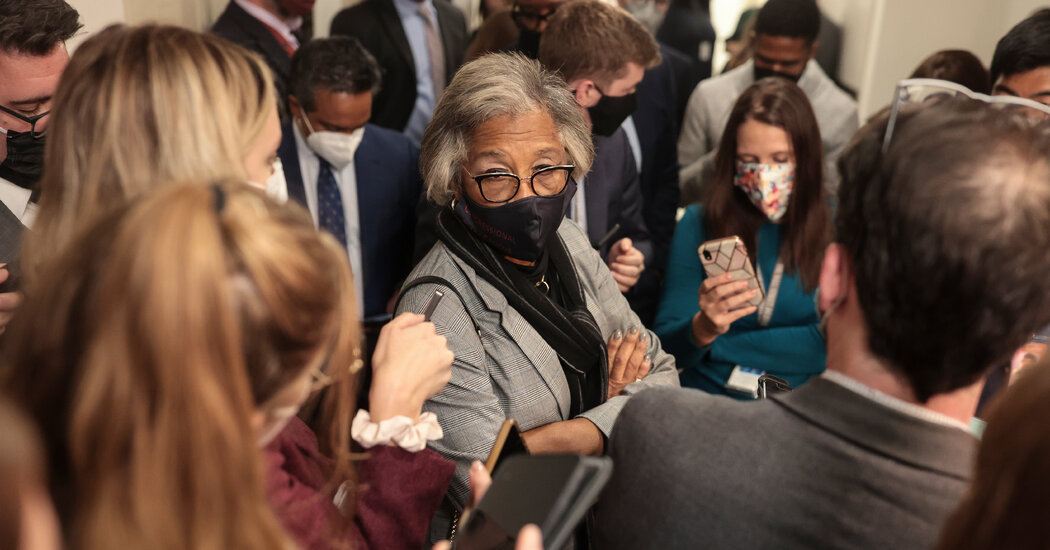
WASHINGTON — Another showdown day over President Biden’s ambitious domestic agenda dawned Friday full of optimism, even after the drubbing that Democrats took in the off-year elections on Tuesday. But by afternoon, lawmakers again seemed stuck when leaders of the Congressional Black Caucus entered Speaker Nancy Pelosi’s office.
Seeking to bridge the gap between a resolute clutch of balking Democratic moderates and a much larger group of liberals demanding that the president’s $1 trillion infrastructure plan only pass concurrently with his $1.85 trillion social welfare and climate change bill, the Black lawmakers proposed a plan that initially seemed far too timid and convoluted: pass the infrastructure bill immediately, then hold a good-faith procedural vote on the larger bill that would have to suffice before its final vote in mid-November.
Ms. Pelosi agreed to the deal and then, tellingly, sent the low-key chairwoman of the Black Caucus, Representative Joyce Beatty of Ohio, out to waiting reporters to tell the world. In effect, the speaker had harnessed one faction of her unruly Democrats to win over two others, and she understood that the soft-spoken African American lawmaker might have had more influence at that point than she did.
Nine hours later, at 11:20 p.m., House Democrats, with help from a few Republicans, sent to Mr. Biden the largest public works bill since President Dwight D. Eisenhower created the Interstate System. They also took a major step toward approving a stalled sweeping social safety net measure, producing the kind of legislative progress many in the party say was long overdue and necessary to avoid an electoral disaster for Democrats in next year’s midterms.
“The American people have made clear one overwhelming thing, I think,” Mr. Biden said on Saturday as he celebrated the approval of the public works legislation. “I really mean it — all the talk about the elections and what do they mean? They want us to deliver. Last night we proved we can. On one big item, we delivered.”
Passage of legislation to pump huge sums of money into crumbling roads, bridges, tunnels and transit, rebuilding airports and expanding rural broadband access was a prodigious feat, set in motion on Tuesday by startling Democratic losses, from New Jersey and Virginia to Seattle. It required multiple rounds of negotiations, egged on by Mr. Biden, that broke down resistance.
Ultimately it happened because faction-on-faction intransigence slowly turned to member-to-member cooperation — all in the service of what should have been an easy task, spending money on projects with obvious, bipartisan appeal in home districts. The contortions it took for the House to pass a bill that had cleared the Senate in August with bipartisan bonhomie underscored just how factionalized the party has become, how powerful each of those factions are in the Democrats’ razor-thin majority — and how difficult it will be over the next year to maintain that majority.
“It is incredibly hard to run a place with such narrow majorities, but what compounds it is, there’s no overlap” within the factions, said Representative Brad Sherman, a 24-year veteran Democrat from Southern California, as he emerged exhausted late Friday from a closed-door meeting of the Congressional Progressive Caucus. “When I first got here, there were liberal Republicans and conservative Democrats. Now, the most liberal Republican is well to the right of the most conservative Democrat, so you’re trying to draw to an inside straight.”
When the gavel fell late Friday night on the 228-206 vote, Democrats gave Ms. Pelosi a sustained and loud standing ovation as she hugged members in the well of the House. And members of the self-styled “squad” of far-left members from extremely safe big-city districts celebrated their six “no” votes, as they argued that passing the infrastructure package jeopardized their leverage on the broader bill — which includes funding for climate change programs, monthly payments to families with children, universal prekindergarten, health care subsidies and a paid family leave program.
“Each and every one of my votes here in D.C. has been in the interest of saving lives,” Representative Cori Bush, an activist-minded freshman from St. Louis, proclaimed of her dissent. “And tonight was no different.”
Two squeamish centrists, Representatives Abigail Spanberger of Virginia and Jared Golden of Maine, withheld their signatures from a key statement that secured enough liberal votes for the infrastructure bill. That statement, using Mr. Biden’s name for the social welfare and climate bill, declared, “We commit to voting for the Build Back Better Act, in its current form other than technical changes,” as soon as the signers obtain an estimate from the Congressional Budget Office consistent with White House figures showing that the measure is fully paid for. With those two signatures withheld, it appears Ms. Pelosi can afford only one or two more defections to save the sprawling bill from defeat.
On the other side of the aisle, Representative Marjorie Taylor Greene of Georgia sicced her social media followers on the Republicans who dared vote for spending vast sums of money, some of it for projects in their districts: “These are the 13 ‘Republicans’ who handed over their voting cards to Nancy Pelosi to pass Joe Biden’s Communist takeover of America via so-called infrastructure,” she wrote on Twitter before listing their names and office phone numbers.
Although 19 Republican senators, including their leader, Mitch McConnell of Kentucky, had voted for the bill in August, Republican leaders in the House pressed their members to oppose the measure, to further the image of a rudderless Democratic majority. And the vast majority of House Republicans did just that, hoping to deny Mr. Biden and Democrats a victory ahead of next year’s midterms — even though the legislation would bring big projects and jobs to many of their states and districts.
Ms. Pelosi’s mobilizing of the Black Caucus was deft. House leaders figured the liberals of the Progressive Caucus would be more receptive to African American members than them — even though most of the group of Black members who carried the compromise forward were also members of leadership or Ms. Pelosi’s lieutenants.
“The C.B.C. wants to land the plane because the C.B.C. represents communities that have the most to gain,” said Representative Hakeem Jeffries of New York, the Democratic Caucus chairman who was also part of the Black caucus group that brokered the compromise. “It’s no more complicated than that.”
Specifically, the idea put forward by the Black caucus members was to finally approve the infrastructure bill being held hostage by progressive lawmakers — and in return, as a sign of trust, the House would also approve the rules of debate for the social welfare bill demanded by the progressives, teeing it up for a vote in two weeks.
And it worked. After Ms. Beatty announced her plan, the speaker called the leader of the Progressive Caucus, Representative Pramila Jayapal of Washington, who told her she had 30 members of the caucus who would vote down the infrastructure bill. Ms. Pelosi — whose insistent demand that the vote would go forward one way or another kept constant pressure on — questioned her figure, and Ms. Jayapal quickly revised it down, to 25.
By 4 p.m., Ms. Jayapal had released a statement saying flatly that the progressives would vote down the infrastructure bill, but then convened her group for the next five hours behind closed doors to make sure the members held firm in their opposition. Then the president started calling. He spoke first to Ms. Jayapal, and then to the larger group on speaker phone, imploring them to trust him.
Yet there was so little trust between the members of Ms. Jayapal’s caucus that she forced them to leave their cellphones on a table outside the meeting room to keep them from texting meeting details to reporters and posting updates on Twitter. Ms. Pelosi, who had a number of loyalists among the progressives, learned of what was happening in the room when the loyalists left to carry messages to her. She sent them back to Ms. Jayapal with messages of her own.
The Infrastructure Bill at a Glance
Ms. Pelosi also kept up a stream of calls to the cellphones parked on a table outside the hearing room where the meeting was taking place, knowing she would not get through. But she wanted her voice mail messages urging members to vote yes waiting for them when they finally emerged.
The progressives slowly caved. The no votes dwindled from 20 to 10 and finally six. Ms. Pelosi could only lose four Democrats, but aides said she was confident that she could pressure at least two of the six to vote with her before the gavel came down. Although she was unsure of how many Republican votes she might get, she thought she had at least 10.
Representative Josh Gottheimer of New Jersey, a key centrist Democrat, has sketched out a statement with Mr. Jeffries and a fellow New Jerseyan, the liberal Democrat Donald Norcross, early that afternoon that they hoped could be signed by balking moderates to placate liberals worried that the centrists might tank their social policy bill.
By 10 p.m., that effort was in high gear. Mr. Gottheimer had brought his laptop to the office of Representative Stephanie Murphy of Florida, where she, Joe Neguse of Colorado, Kathleen Rice of New York and Kurt Schrader of Oregon sat shoulder to shoulder around a table and hammered out the final language. Mr. Biden spoke by phone to Mr. Gottheimer, relaying language that liberals said they needed and fixing a date — Nov. 15 — when the social welfare bill would be brought up for consideration by the full House.
Analysts and party advisers said Democrats would need to now quickly pivot and shift the conversation to selling the many elements of the legislation to the public or risk any success being lost in the cacophony of internal disputes and Republican attacks.
“Basically the sausage making and the sum have taken over the contents,” said David Axelrod, who was President Barack Obama’s chief political adviser. “They need to disaggregate this, take the individual elements and own them, claim them and brag about them. And as people start seeing and feeling them, they need to take credit for it.”
Karine Jean-Pierre, the White House deputy press secretary, said the administration was prepared to dispatch senior officials to promote Mr. Biden’s agenda after the passage of the legislative package.
“We have to go out there and talk about these bills,” she said. “We’ll get out there, we’ll do a blitz and make sure that messaging is out there on what we have done and how we’ve delivered for the American people.”
Transportation Secretary Pete Buttigieg got an early start on Saturday, talking about his department’s plans for the infrastructure funding.
“We cannot wait to deploy resources to improve roads and bridges in rural areas and big cities alike,” he said on MSNBC, adding “These are truly historic proportions in terms of the level of investment and we know we have a responsibility to get it right, now that Congress has given us the tools.”
But some Democrats had to concede their pessimism. Representative Alexandria Ocasio-Cortez of New York, the face of youthful liberal activism, recounted how the generous benefits approved early this year in Mr. Biden’s pandemic relief law had done little to stem the election losses on Tuesday. Voters’ short-term memory, combined with new voting restrictions and partisan redistricting in Republican-controlled states, and Democrats are in trouble, she said, regardless of their achievements.
“What is very pressing is the protection of voting rights and combating against gerrymandering,” she said. “And I believe that if the Senate does not move on that, there’s no amount of material gains that we could deliver that will compensate.”
Zolan Kanno-Youngs and Catie Edmondson contributed reporting.




